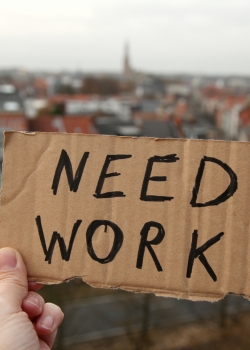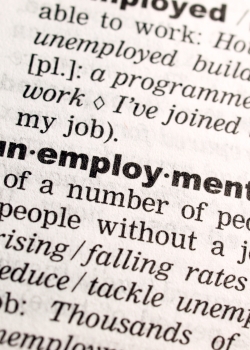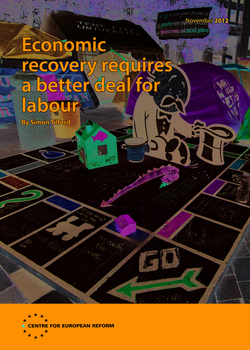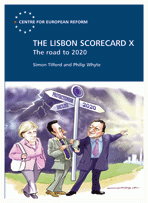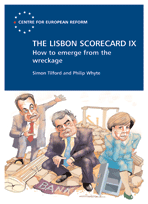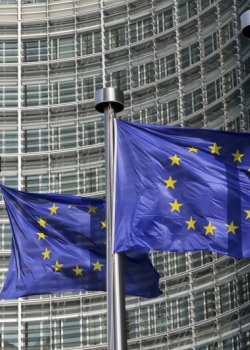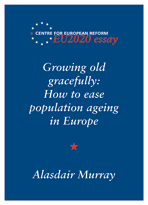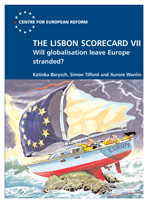Labour markets, education & skills
Europe places too much faith in supply-side policies
18 January 2013
The damage done to Europe's growth potential by very low investment and mass unemployment is likely to offset the benefits of structural reforms.
Europe's youth job crisis
30 November 2012
Some 14 million young people in the EU are not in work or education. German-style apprenticeships and flexible labour markets could help them get jobs.
Economic recovery requires a better deal for labour
05 November 2012
Unless labour receives a larger share of the pie, Europe's economic recovery will prove elusive and popular hostility to markets will grow.
Tackling the scourge of youth unemployment
28 March 2012
European youth unemployment is unacceptably high. Governments are trying to push young people into work, despite weak demand: they would do better to educate them.
Innovation: How Europe can take off
08 July 2011
Every EU government supports innovation, believing that it will help Europe to meet the numerous economic, social and environmental challenges that it faces.
Business leaders risk discrediting markets
13 May 2010
Despite their battered reputation, markets remain the best way of generating economic growth. But the market economy faces a crisis of legitimacy brought about by rising inequality and a breakdown of the relationship between risk and reward.
The Lisbon scorecard X: The road to 2020
15 March 2010
The EU's Lisbon agenda has failed to deliver what it promised. Although most member-states have made some progress towards the targets they set themselves in 2000, their commitment to reform has been half-hearted.
Why education should be at the heart of EU2020
01 February 2010
At their summit in March, EU heads of state and government must decide what should succeed the Lisbon agenda – the ambitious programme of supply-side reforms that was launched in 2000.
Issue 70 - 2010
29 January 2010
- How should Europe respond to China's strident rise?, Charles Grant
- Why education should be at the heart of EU2020, Philip Whyte
- Does the EU need a public prosecutor?, Hugo Brady
Are the British the new French?
05 May 2009
The British tend to deride France as a hopelessly statist, anti-entrepreneurial country full of bolshie workers intent on extracting disproportionate rewards for their labour and a state too weak to resist them. This characterisation is not wholly inaccurate.
The Lisbon scorecard IX: How to emerge from the wreckage
13 February 2009
EU governments are taking increasingly unorthodox measures to prevent the economic crisis from overwhelming their economies. They are right to intervene, but their policies must not undermine Europe's long-term economic growth prospects in the process.
Farewell, Polish plumber
07 August 2008
When the EU expanded its membership in 2004, the UK was one of only three EU countries – Ireland and Sweden were the others – fully to open its borders to migrants from the ten new member states.
Liberal reforms are no threat to social Europe
01 April 2008
Europeans have long sought to reconcile markets with social solidarity. The EU’s economic reform programme, the Lisbon agenda, falls squarely within this tradition. Launched in 2000, its vaulting ambition was to turn the EU into the “most competitive and dynamic knowledge-based economy in the world by 2010”.
Issue 59 - 2008
28 March 2008
- Liberal reforms are no threat to social Europe, Philip Whyte
- For a new Iran policy, Christoph Bertram
- Applicants sought for new Council president, Hugo Brady
The Lisbon scorecard VIII: Is Europe ready for an economic storm?
01 February 2008
After more than half a decade of economic gloom, the years 2006 and 2007 restored some much-needed optimism to Europe. Faster GDP growth and falling unemployment were at least partly due to the implementation of structural reform.
Growing old gracefully: How to ease population ageing in Europe
17 January 2008
Europe stands on the cusp of a demographic revolution. Rising life expectancy and low fertility are radically transforming Europe’s demographic profile. Ageing populations pose profound political, economic and social challenges for Europe.
We are all Nordic now, or are we?
02 April 2007
The EU drew up its Lisbon reform agenda in 2000 with the thinly disguised goal of catching up with the US. But the idea that Europe should strive to adopt ‘Anglo-Saxon’ capitalism is abhorrent to those who cherish Europe’s more extensive welfare states.
The Lisbon scorecard VII: Will globalistion leave Europe stranded?
01 February 2007
Globalisation and the rapid integration of China and India into the international economy present huge opportunities for the European Union.
Europe’s new division of labour
01 June 2006
Two years after the accession of ten new members, the EU is showing clear signs of enlargement fatigue. While most politicians and economists insist that eastward enlargement has been good for the EU, voters are increasingly sceptical.
Issue 48 - 2006
26 May 2006
- Europe’s new division of labour, Katinka Barysch
- Unblocking EU-NATO co-operation, Daniel Keohane
- Can we live with a nuclear Iran?, Mark Leonard







